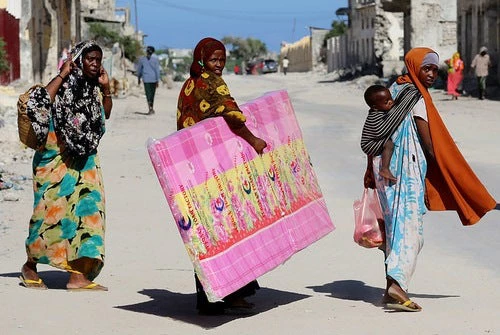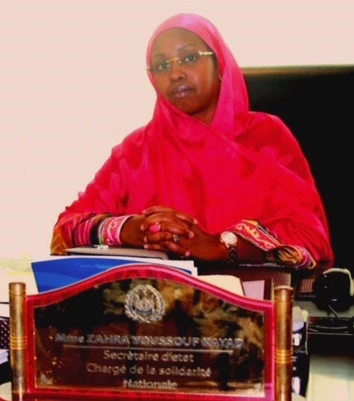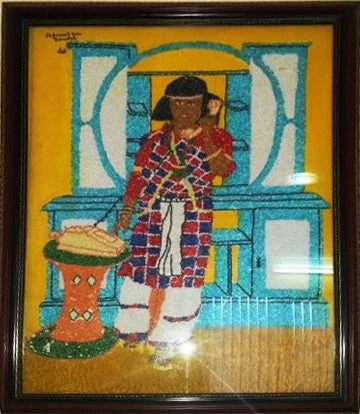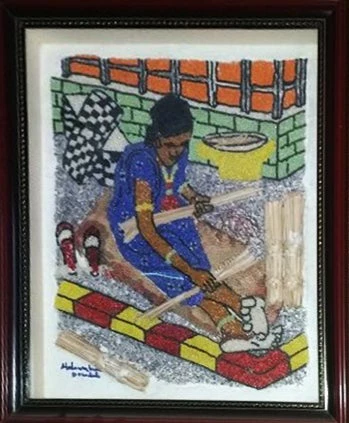 Walk into Zahra Youssouf Kayad’s office and you’ll see colorful local artwork on the walls. One picture depicts a woman making straw brooms. “Whenever I go to other parts of the country, I ask to see the local crafts,” says Ms. Kayad, who is Djibouti’s Minister of Social Solidarity. The ministry oversees Djibouti’s fight against poverty.
Walk into Zahra Youssouf Kayad’s office and you’ll see colorful local artwork on the walls. One picture depicts a woman making straw brooms. “Whenever I go to other parts of the country, I ask to see the local crafts,” says Ms. Kayad, who is Djibouti’s Minister of Social Solidarity. The ministry oversees Djibouti’s fight against poverty.
A little background: Under Ms. Kayad, the Djibouti government, with support from the World Bank, has implemented a cash-for-work program with community meetings that promote nutrition for pregnant women and young children. World Bank researchers are finishing an evaluation of this nutrition-sensitive social safety net program to see how effective it’s been in combatting malnutrition. In doing so, they’ve stumbled onto an untapped opportunity.
As part of the program, women are creating beautiful baskets, belts, and other handicrafts using grass and pearls. This has helped inspire a new handicrafts program to link women who make handicrafts—and usually have no way to sell them—with potential buyers throughout the country and abroad.
In May 2015, the World Bank approved a US$2.73 million grant from the Government of Japan to fund a new employment program for young people and women.
In an interview, Ms. Kayad discusses what’s being done and why it matters.

of Social Solidarity
Though the final results of the impact evaluation aren’t in yet, what have you learned so far?
It has been amazing to see how empowering the program has been. The women who enrolled are earning income for their household, and that’s given many of them financial independence for the first time. Earning money independently has allowed them to have a say in where the money goes .
Why is financial independence so important for women in Djibouti?
The women in the cash-for-work program have reinvested their earnings into the household . They spent the money on themselves and their children, buying more nutritious foods, for example, which has improved their family’s health and wellbeing. Financial independence has opened new possibilities and new horizons.
 What sort of new possibilities are they now exploring?
What sort of new possibilities are they now exploring?
The women have experienced firsthand that if they can learn one new activity—whether it’s crafts or street sweeping—they can learn another. And that has encouraged them to try new things, like opening their own small enterprise, such as producing and selling brushes.
What are typical crafts that women make?
For generations, since nomadic times, women in Djibouti have been using grass and pearls to make beautiful crafts . Grass is used to make baskets—either for shopping or as decoration—and pearls are commonly used for jewelry. Women also use wood to make objects for decoration, as well as traditional hairbrushes.
What obstacles were women coming across when selling their crafts?
First and foremost, they don’t have access to a market that’s wide enough. Many of these women live in rural areas and so they need to travel to the capital, which can take up to a day, and even then there are no regular fairs or exhibitions with a wide customer base. … Another problem is that often the finished product isn’t of a high enough quality. Either the design isn’t that attractive or it’s just not as useful as it needs to be—like a basket that’s not large enough to use at the market.
As part of the program, professional designers will work with the women.
 You clearly have a passion for crafts. Is that something you do in your free time—though I’m guessing you don’t have a lot!
You clearly have a passion for crafts. Is that something you do in your free time—though I’m guessing you don’t have a lot!
I don’t make crafts, but some of my earliest memories are sitting with my maternal grandmother when I was I was about five, while she made traditional dolls. My paternal grandmother was also devoted to crafts. She founded an association in the city of Dikhil with other women that taught women to make cultural crafts.
We’re waiting to see what happens with this handicrafts program. If it’s successful it might be expanded to other parts of the country. In that way, I hope to continue my grandmothers’ legacy.
Read more about the World Bank’s work in Social Protection and Labor here.


Join the Conversation